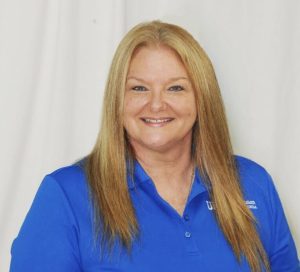A Fort Pierce native whose life is immersed in St. Lucie County’s agricultural and 4-H programs is a scientist with more than two decades of research and professional publishing experience.

Last month, Audrey Hamner Beany returned to her horticultural roots.
Beany, a second-generation cattle rancher of the Hamner family and a longtime UF/IFAS 4-H supporter, is a Biological Scientist at the UF/IFAS Indian River Research and Education Center (IRREC) in Fort Pierce, Florida.
New role in Plant Root Biology Laboratory
Her new position is to serve as a team member of Lorenzo Rossi’s Plant Root Biology Laboratory, in which Beany will work with one faculty member, a postdoctoral research associate, a visiting scholar, three graduate students, a laboratory technician, and many collaborators and associates that typically include more than 15 researchers.
As a Biological Scientist, Beany’s duties will involve laboratory management, including maintenance and selection of scientific equipment for purchase, scientific protocol development, and experimental design. Rossi said Beany’s role would evolve to scientific experiments and publishing along with the researchers associated with the lab.
Beany’s curriculum vitae, an advanced resume that includes lists of honors and awards, community service, memberships in professional organizations, and skills with scientific equipment, also lists published works.
Experienced publisher
It is the published works that impress Rossi. Beany is the first author of a book chapter about fruit quality. She is a co-author of seven scientific journal articles, one of which she served as the first author. The publication, about plantains, appeared in Fruit Varieties Journal. Her name also appears on a list of 29 trade magazine articles, 19 of which she is the first author, with topics ranging from aquaculture production to vegetables. She authored 21 abstracts and 13 additional publications, most of which Beany appears as first author on vegetable field trial reports.
“There is no question Audrey will assist our laboratory associates with publications, conduct experiments, and present at industry and scientific meetings,” said Rossi. “Audrey’s experience will continuously benefit our laboratory work output and graduate students.”
Vegetable production
Beany’s employment with IRREC began in 1994, with her first position as a biological scientist under the direction of Peter “Pete” Stoffella, an expert in vegetable production.
In 2009, Beany became a Biological Scientist for IRREC’s newly developed aquaculture program, a 26-acre site with four grow-out ponds, a retention pond, a 7,200 square-foot hatchery building, a greenhouse, water treatment, and generators. Beany assisted with programs that bred gorgeous ornamental fish in captivity for the first time.
International presentations
From her position as a scientist, Beany was invited to present her work at four international aquaculture meetings, seven national vegetable production meetings, and four regional meetings.
Beany’s volunteer work involves several agricultural service organizations related to the beef cattle industry, UF/IFAS 4-H youth development efforts, and community-specific events.
“Audrey’s community leadership skills will translate to our scientific collaborations, and her scientific experience will benefit our team in ways we have yet to imagine,” said Rossi. “Audrey Beany brings two and a half decades of valuable experience to our efforts to advance plant root science, and we are pleased she has returned to her roots.”
Beany earned an associate degree in animal science from Abraham Baldwin Agricultural College in Georgia. She completed a bachelor’s in animal science with a minor in food and resource economics and a master’s in Extension education from the University of Florida.
 10
10
